

MOOCs: What role do they have in higher education? - Center for Instructional Technology. After working in the field of Instructional Technology for almost twenty years, I’ve seen many technologies that might impact higher education come and go.

In the initial stages, universities often experiment with the latest gadgets or Internet services without thinking too much about the concrete, real-world applications the technologies might have. MOOCs – Massive Online Open Courses – are a new model for online courses that have quickly gained interest and support among universities in recent months. We still find ourselves at the experimental stage, but it’s not too early to think about what kind of long-term impact MOOCs might have in higher education. Minglebox. MOOCs are the biggest upcoming trend in the current education scenario.
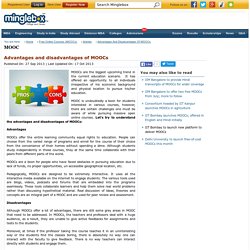
It has offered an opportunity to all individuals irrespective of his economic background and physical location to pursue his/her education. MOOC is undoubtedly a boon for students interested in various courses, however, there are certain challenges one must be aware of while pursuing massive open online courses. Let’s try to understand the advantages and disadvantages of MOOCs: Advantages MOOCs offer the entire learning community equal rights to education. MOOCs are a boon for people who have faced obstacles in pursuing education due to lack of funds, no proper opportunities, un-accessible geographical location, etc.
Pedagogically, MOOCs are designed to be extremely interactive. Advantages and disadvantages of MOOCs - Minglebox.com. What are MOOCs, and how can you benefit from them? MOOC: Advantages and Disadvantages - Ignite Engineers. MOOC (Massive Open Online Courses) is a new paradigm of education for anyone, anywhere, anytime.

It came up with numerous opportunities both for students as well as teachers. Follow the post “MOOC and Technical Education” to know more about MOOC. In this section IgEn has discussed both sides of coin for MOOC in current education system and its impact on effective Teaching and Learning process. Advantages of MOOC: (1) MOOC creates the opportunity for sharing ideas & knowledge and also helps improving lifelong learning skills by providing easy access to global resources. (2) It improves cross cultural relationships which leads to collaboration between institution educators and learners locally and internationally.
Massive Open Online Courses (MOOCs): Advantages and Disadvantages. In the age of online learning, MOOCs (Massive Open Online Courses) have become a preferred way of interactive online learning.
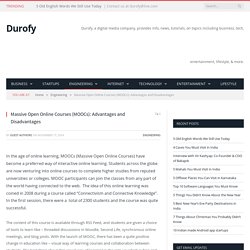
Students across the globe are now venturing into online courses to complete higher studies from reputed universities or colleges. MOOC participants can join the classes from any part of the world having connected to the web. The idea of this online learning was coined in 2008 during a course called “Connectivism and Connective Knowledge”. In the first session, there were a total of 2300 students and the course was quite successful. Moocs: Advantages and disadvantages. Study finds tangible benefits for learners from Coursera's massive open online courses.
Unlike at colleges and universities, where students finish their studies and leave with a diploma, most learners who complete one of Coursera’s massive open online courses report benefits that help them in less measurable ways.
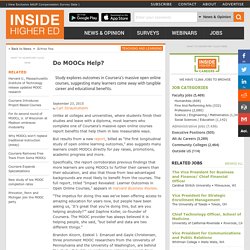
But results from a new report, billed as “the first longitudinal study of open online learning outcomes,” also suggests many learners credit MOOCs directly for pay raises, promotions, academic progress and more. Specifically, the report corroborates previous findings that more learners are using MOOCs to further their careers than their education, and also that those from less-advantaged backgrounds are most likely to benefit from the courses. The full report, titled "Impact Revealed: Learner Outcomes in Open Online Courses," appears in Harvard Business Review.
“The impetus for doing this was we’ve been offering access to amazing education for years now, but people have been asking us, ‘It’s great that you’re doing this, but are you helping anybody?’” Colleges and universities begin to assess the benefits of MOOCs. When Cornell University joined the edX consortium last May, the impetus came not only from professors who wanted to offer MOOCs but also from prospective students who were asking admissions officers about whether the university provided these courses.
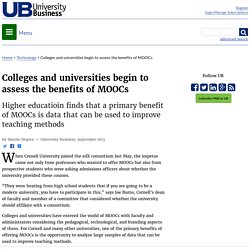
“They were hearing from high school students that if you are going to be a modern university, you have to participate in this,” says Joe Burns, Cornell’s dean of faculty and member of a committee that considered whether the university should affiliate with a consortium. Colleges and universities have entered the world of MOOCs with faculty and administrators considering the pedagogical, technological, and branding aspects of them. For Cornell and many other universities, one of the primary benefits of offering MOOCs is the opportunity to analyze large samples of data that can be used to improve teaching methods. The purpose of the course was to help students pass developmental math more quickly so they can move on to college-level courses. The professional development advantages of MOOCs : DelCor. MOOCs—massive open online courses—aren’t in the news as much as they were a few years ago when popular MOOCs like Coursera and EdX first arrived on the scene.
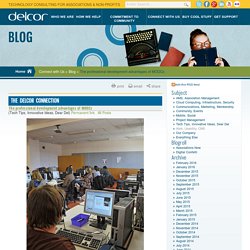
However, MOOCs are growing. In 2014, 400 universities offered more than 2,400 courses to 17 million students around the world. Who’s Benefiting from MOOCs, and Why. In the last three years, over 25 million people from around the world have enrolled in Massive Open Online Courses (MOOCs) offered by Coursera, EdX, and other platforms.
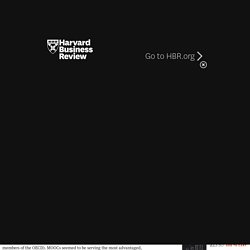
Initially heralded as a revolution in higher education access, expectations have been tempered as research revealed that only a small percentage of these millions were completing the courses, approximately 80% already had at least a bachelor’s degree, nearly 60% were employed full-time, and 60% came from developed countries (defined as members of the OECD). MOOCs seemed to be serving the most advantaged, the headlines blared, and most people weren’t even completing them. Are MOOCs merely an intellectual diversion for the well educated and well-off? Do they provide any tangible benefits? We are not neutral parties. Pros and Cons of MOOCs - Massive Open Online Courses. By Deb Peterson Updated June 12, 2015.
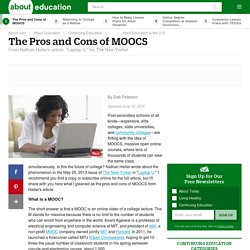
Post-secondary schools of all kinds—expensive, elite colleges, state universities, and community colleges—are flirting with the idea of MOOCS, massive open online courses, where tens of thousands of students can take the same class simultaneously. Is this the future of college? Nathan Heller wrote about the phenomenon in the May 20, 2013 issue of The New Yorker in "Laptop U. " I recommend you find a copy or subscribe online for the full article, but I'll share with you here what I gleaned as the pros and cons of MOOCS from Heller's article. What Is a MOOC? The short answer is that a MOOC is an online video of a college lecture.
Continue reading below our video Play Video In the first few hours of posting the course, he told Heller, he had 10,000 students sign up from all over the world. The Pros MOOCs are controversial. Are free. The Cons Could cause teachers to become nothing more than "glorified teaching assistants. " Related at About.com: UCL Digital Education team blog. Many institutions, and countries, the world over have subscribed to MOOC-mania.
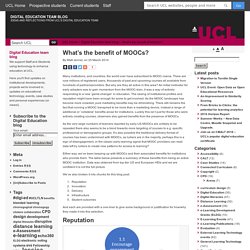
There are now millions of registered users, thousands of past and upcoming courses all available from hundreds of partners/providers. But why are they all active in this area? An initial motivator for early adopters was to gain momentum from the MOOC-train, it was a way of actively responding to a new ‘game-changer’ in education. The raising of institutional profiles and reputation might have been enough for some to get involved. As the MOOC landscape has become more crowded, pure marketing benefits may be diminishing. As the very large numbers of learners reported by early US MOOCs are unlikely to be repeated there also seems to be a trend towards more targeting of courses to e.g. specific professional or demographic groups. Either way, we’ve been keeping up with MOOCs and their associated benefits for institutions who provide them. We’ve also broken it into chunks for this blog post: Reputation 1.3 Outreach.
MoocGuide - 2. Benefits and challenges of a MOOC. Benefits and Challenges of a MOOC If you look at the MOOC realm, you will find that MOOC’s have eager supporters, but also avid criticizers. What are the advantages of MOOCs and how can you benefit from them? Pedagogy Of MOOCs And Benefits For Modern Professionals. Massive Open Online Courses, known under the widely used acronym MOOCs, have taken the modern education world by storm, offering a wide variety of options for students worldwide.
Their greatest advantage is, of course, the fact they are provided for free or at low prices, which is why both people with no official education and those with a university degree are readily embracing the opportunities. Clearly, the rapid rise in the number of platforms that provide such courses is mostly due to the advancements in web technologies. However, it is students’ motivation for constant improvement that keeps pushing the boundaries in the field. The fact that these courses are well thought-out and easy to follow additionally makes them an excellent resource for anyone willing to improve their career prospects.